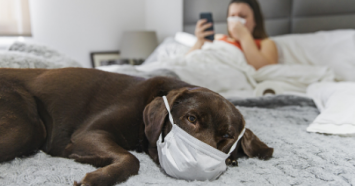
For most people, when you adopt a pet they become a member of your family. The strength of the human-animal bond has put us at greater risk for acquiring diseases from our pets, known as zoonotic diseases in the veterinary world. These zoonotic diseases can include viruses, bacteria, internal parasites, and a number of other pathogens. In particular, sleeping with your pet and swapping kisses with him have recently received much criticism in the media.
Can My Dog Get The Coronavirus?
Data indicates that no, your dog or cat cannot spread the novel coronavirus COVID-19 and is not at risk of getting sick from the coronavirus.
Now that doesn’t mean your pet is immune from catching a cold. However, these symptoms vary compared to what human’s experience. It is always best to play it on the safe side and schedule a veterinary visit if you are questioning your pet’s health.
Sleeping With The Enemy
According to a recent survey of pet owners by the Centers for Disease Control, over half of all dog owners in America sleep with their dogs next to them. While zoonotic diseases have received much mainstream attention recently, is this real cause to kick your pets out of your bed?
If your pet is infested with ectoparasites (such as fleas or ticks) or hasn’t recently had a fecal exam, then you are putting yourself at risk. Many parasites are microscopic, such as Giardia, Cryptosporidium, and hookworms. Even roundworms, which are visible to the naked eye in adult form (and resemble cooked linguini pasta), aren’t typically seen in a pet’s stool or vomit until a pet is infested with a heavy load. Living in close quarters with our pets is yet another reason to stick with year-round flea, tick, and heartworm preventative medicine.
Smooches With Pooches
Being licked by pets is a common way for bacteria to be transmitted between pets and people. This can potentially cause dental disease or, rarely, even more serious disease. There are the isolated cases of cellulitis and meningitis being traced back to swapping saliva with our household pets, but they are often associated with levels of affection that aren't routinely recommended, such as pets using newborn's pacifiers as toys, dogs licking infant’s faces, or pets licking open wounds (without immediate sanitation methods taken).
In the US, hookworms and roundworms are the most common parasitic zoonoses associated with dogs, not the rare cases of meningitis transmitted from sloppy kisses. If you maintain your pooch on heartworm preventative medications year round, they will be protected against the most common parasites. The price of monthly heartworm prevention seems very inexpensive when you consider it is a way to help keep your human family protected from intestinal parasites your pup can carry and shed.
Pets Keep Us Healthy Too
While there are some disease risks that rise when we share our home with pets, with proper hygiene and thorough preventative care, relishing in furry snuggles can have a wealth of benefits, including psychological support, friendship, and even better health.
Pets are a natural mood elevator! In fact, playing with a dog can elevate levels of serotonin and dopamine.
Infants are less likely to develop allergies if they share their home with a family dog. They also are less likely to develop eczema.
Having pets tends to lead to better heath for the elderly, particularly less anxious outbursts for those with Alzheimer's. At least one insurance company (Midland Life Insurance Company) even asks elderly applicants if they have a pet as part of their screening.
Sharing your life with a dog or cat has cardiovascular benefits as well. It appears to
and heart attack patients with pets survive longer than those without pets.
In Summary
While extra cautions should be taken with the young, elderly, or immune-compromised, the studies shows there is a low risk of zoonotic disease transmission from sharing your home with a healthy pet. Any area licked by a pet, especially for those at increased health risk or an open wound, should be immediately washed with soap and water. Pets should be kept free of all ectoparasites, routinely dewormed for protection against internal parasites, maintained on heartworm prevention medication year round, and regularly examined by a veterinarian. Even with proper care and protection of your pets, special attention must be exercised to avoid sources of zoonotic diseases from the outdoors, such as gardening with bare hands. Keeping your fuzzy kids healthy is crucial to keeping your human family healthy, especially in these times where the line separating family members gets, well, fuzzy.